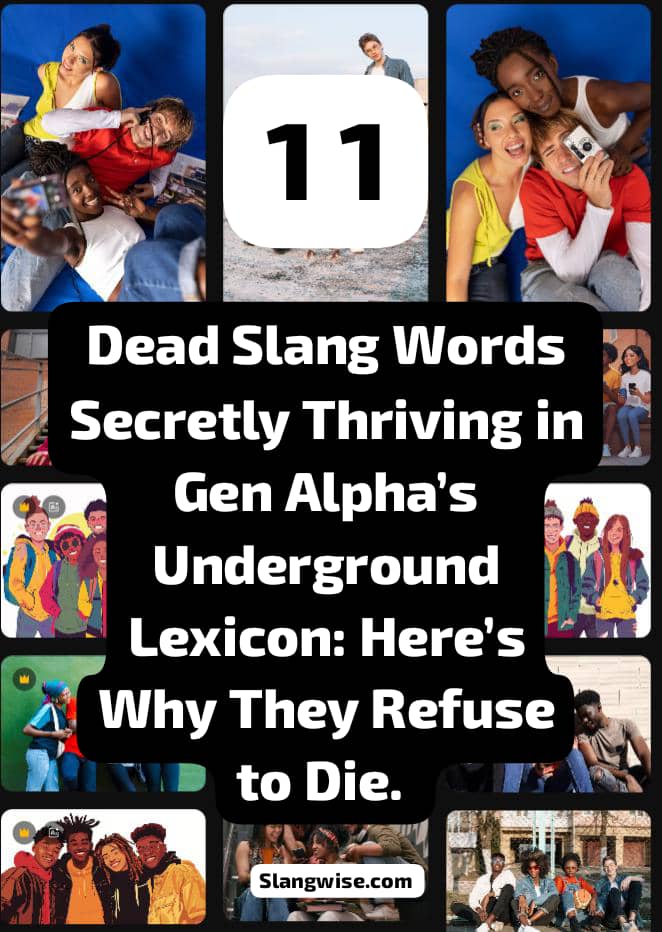Language never truly dies, it hibernates, shifts, and sometimes returns stronger. In tight-knit digital communities, Gen Alpha (born after 2010) quietly revives and remixes words the mainstream declared dead.
Below I trace eleven such terms: each entry gives a short origin, a Gen Alpha twist, a current-use example, and the clear reason the word still works today. Read on for plain, reliable signs that these comebacks are real, not just passing fads.
Table of Contents
In a Nutshell
- Eleven once-archaic slang words are resurfacing among Gen Alpha, proving that no word ever truly dies. The eleven slangs are: Groovy, Radical (Rad), Tubular, YOLO, Swag, Lit, On Fleek, Dope, Sick, Cringe, GOAT.
- Digital Reinvention: These expressions flourish in private chats, TikTok transitions, and niche Discord servers, where youth remix them with new flair.
- Cultural Echoes: Each term carries echoes of its original era, from surf culture to early social media, offering a bridge between past and present.
- Language Evolution: Tracking these revivals gives insight into how young people claim identity, establish in-group status, and reshape meaning.
Slangwise Tip: “When you hear an old word in a new place, pay attention, it’s the soundtrack of culture repeating itself.”
1. Groovy
Groovy means something is Cool, excellent, or enjoyable.
It’s a hallmark of 1960s counterculture, “groovy” referred to music “in the groove,” implying effortless rhythm and style (Oxford Learners’ Dictionary).
Gen Alpha Twist: On TikTok, creators pair retro filters with the hashtag #GroovyVibes to showcase vintage thrift-store hauls or throwback dance routines.
For instance: “Check out my vinyl shelf tour, totally groovy, right?”
2. Radical (Rad)
Radical is a slang term for remarkable, extreme, or impressively cool. It originated from the Surf and skate communities of the 1980s popularized “radical,” shortened to “rad,” to praise daring tricks and fearless style (Merriam-Webster).
Gen Alpha Twist: In esports livestreams, viewers spam “Rad!” or “R@d!” after a clutch play. Some even combine it with emojis, 🤙🏄♂️, to mimic its surf roots while celebrating gaming prowess.
Example: “That headshot clutch in Valorant was so rad, I nearly fell off my chair!”
3. Tubular
Tubular is a slang term for fantastic and excellent.
It is nother 1980s surf lexeme, riffing on the tube-shaped waves surfers ride.
Gen Alpha Twist: Used ironically on Snapchat stories: a snap of a perfectly made pancake might receive the caption, “Breakfast is totally tubular!”
For Instance: “Just got VIP seats for the concert, this is tubular!”
4. YOLO
YOLO = You Only Live Once, and it encourages bold action or risk-taking.
It was popularized by Drake’s 2011 hit “The Motto,” quickly became a social-media rally cry.
Gen Alpha Twist: Appears in TikTok voiceovers urging friends to try obscure food combos or midnight thrift-shop runs. Ironically, some users now tag “#NoYOLO” to signal their plans are decidedly low-key.
For Instance: “I booked a last-minute flight to Tokyo, YOLO!”
5. Swag
Swag means cool confidence or style.
Swag originally was 19th-century slang for stolen goods, and it evolved into a hip-hop term in the 2000s denoting style and swagger.
Gen Alpha Twist: In private Discord channels, members award each other “swag points” for custom avatar art or unique Minecraft skins. The term also thrives in photo captions: “New drip, fresh swag.”
For example: “Your sneaker collection is next-level swag, where’d you get those?”
6. Lit
Lit is very common among Gen Zs and Gen Alphas. Lit means Exciting, excellent, or intoxicated.
It is an African-American Vernacular English (AAVE) and its usage dates back decades; mainstream adoption began in the 2010s rap scene.
Gen Alpha Twist: Beyond praising parties, Gen Alpha uses lit to approve everything from a jaw-dropping TikTok transition to an unexpectedly funny homework meme.
For Example: That glow-up TikTok edit is so lit, I replayed it five times!
Related: 38 Iconic Slang Words of the past 50 years
7. On Fleek
On fleek is slang word for perfectly styled or looking flawless.
It’s a 2014 Vine video by Kayla Newman (“eyebrows on fleek”) that turned the phrase viral.
Gen Alpha Twist: Now extended beyond eyebrows to describe anything impeccably done: “This code review is on fleek,” or “Your room tour vid is so on fleek.” Often accompanied by the 👌 emoji.
For Instance: Your presentation slides are on fleek, so clean and professional!
8. Dope
Dope means amazing or very cool.
The slang dope originally describe narcotic effects, it shifted to mean excellent in hip-hop and skate culture of the ’80s and ’90s.
Gen Alpha Twist: Employed on Instagram captions for fan art or in comments under indie-game trailers: “This concept art is dope.”
For Instance: Your fanart of my OC is seriously dope, thanks for sharing!
9. Sick
Sick in slang means remarkably good or impressive.
Surf and skate crews used sick in the 1980s to describe mind-blowing tricks.
Gen Alpha Twist: In streaming chats, viewers type SICK! after a streamer pulls off a rare achievement. The word often rises above wow or cool, signaling deep admiration.
For Example: “You maxed out your stats in one week? That grind is sick!”
10. Cringe
Cringe means embarrassing or awkward to the point of discomfort.
It’s early 2000s internet culture, marking content so awkward it makes viewers physically wince.
Gen Alpha Twist: Used liberally on TikTok’s “POV” trend to critique cringe-inducing parental posts or outdated challenges. Some users create “Cringe Compilation” playlists on Spotify for guilty-pleasure listening.
Example: “Watching grandpa try that dance trend was total cringe, but I can’t look away!”
11. GOAT
GOAT = Greatest Of All Time.
Sports journalism in the 1990s began calling top athletes the GOAT; the acronym sealed its place in slang.
Gen Alpha Twist: Rapidly adopted in gaming: players dub someone “the GOAT” after flawless speedruns or record-breaking scores. The tag #GOAT floods comment sections when someone posts an unbeatable highlight.
Example: “She hit a 1v5 ace in CS2, undeniably the GOAT!”
Tracking the Underground Pulse
Although major dictionaries update slowly, internet search trends (e.g., Google Trends) and social-media analytics confirm periodic spikes in these terms’ usage.
For instance, “on fleek” saw a revival on TikTok in early 2025, while “rad” enjoys steady play in gaming streams. Keeping an eye on niche platforms like Discord and private Snapchat groups offers the clearest view of these under-the-radar comebacks.
Conclusion
Gen Alpha’s linguistic playground spans private servers, ephemeral video apps, and curated playlist culture. Here, once-forgotten slang finds new life, reminding us that language evolves in cycles.
By observing how youth communities resurrect and reshape words like “tubular,” “swag,” or “YOLO,” we glimpse the ongoing dance between tradition and innovation.
For anyone studying modern youth culture, linguists, marketers, or content creators, these underground lexical currents offer invaluable clues to the future of communication.
Language may seem to bury its past, but Gen Alpha shows us that nothing stays dead for long, every term waits its turn to make a comeback.

